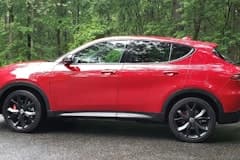2023 Mazda CX-30
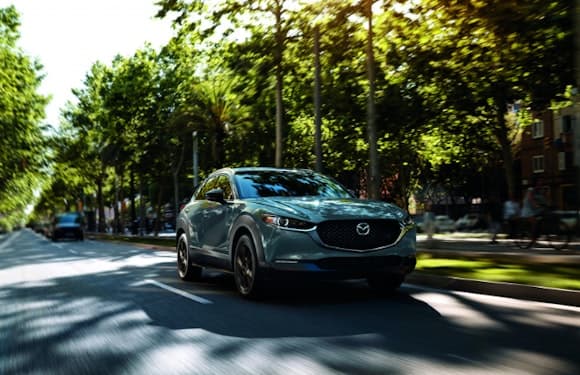
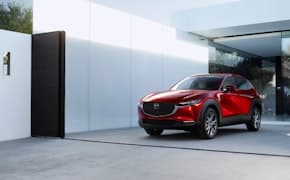
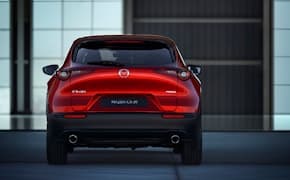
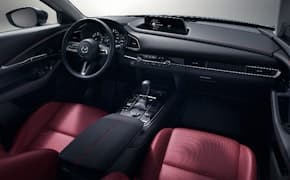

Show all photos
Summary
The CX-30 is Mazda’s smallest crossover, bringing the brand’s signature upscale design and engaging driving dynamics with a healthy helping of utility and tech. It’s got a generous list of standard features, comfortable accommodations, and sleek styling to boot.
- Engaging handling
- Available turbo engine pulls hard
- Upscale interior
- Non-touch infotainment is clunky
- Tight rear seat
- Base powertrain gets more power and better gas mileage
Engine
Horsepower
MPG
Max Seating
Basic Warranty
Verdict - Is the Mazda CX-30 a Good SUV?
The Mazda CX-30 is a solid subcompact SUV, offering a reasonable price tag and generous standard features. Its engaging driving dynamics and sleek styling should put it on any enthusiast’s list, and the high-end interior gives the SUV a premium feel at odds with the price. Its base engine delivers decent power and acceleration, but the available turbo engine turns the SUV into a lively and responsive vehicle with plenty to like. The good vibes are especially strong around town, where the CX-30’s tidy dimensions make it easily maneuverable and less stressful to drive than its midsize counterparts.
Mazda equips the CX-30 with a cabin that feels torn from an SUV in a price bracket a few steps higher. The design is visually appealing, and all surfaces come covered in nice materials. It offers solid build quality inside, and there are no creaks or rattles on rough road surfaces. That said, there’s a bit more road and wind noise than most would appreciate, and the outward visibility could be better in some directions.
Ultimately, the CX-30 does enough to outshine the competition, and it offers plenty of value for the price, despite the fact that its starting MSRP is slightly more expensive than its rivals. Its most significant downfall is its infotainment configuration, which sidesteps touchscreen tech in favor of a rotary dial controller that takes effort and attention to use. The SUV could also use more rear seat and cargo space, but these are small complaints about an otherwise fantastic subcompact family hauler.
Overall Car Talk Award
Car Talk researchers have tested this vehicle and decided to award it a 8.4 out of 10 based on our years of expertise and stringent criteria.
8.4/10
We have reviewed all of the following aspects of this vehicle.
9/10
9/10
7/10
Mazda CX-30 vs. The Competition
Americans buy SUVs like they’re going out of style, making subcompacts the go-to for many families looking for a small vehicle with good cargo and people-hauling capabilities. That makes the subcompact SUV segment a must-win for any automaker daring enough to enter it, and the CX-30 has done enough to come out on top.
Mazda CX-30 vs Kia Seltos
The Kia Seltos got notable revisions heading into the 2024 model year, but even the older 2023 is a compelling alternative to the CX-30. It’s got user-friendly tech features, a comfortable ride with confidence-inspiring handling, and a surprisingly spacious interior with great cargo space and nice materials throughout. Like the CX-30, its base engine leaves much to be desired, though also like the Mazda, it’s a small complaint about an otherwise great vehicle.
Mazda CX-30 vs Volkswagen Taos
The VW Taos debuted for the 2022 model year, bringing a comfortable ride with a roomy interior and solid fuel economy. It picked up additional driver assistance tech in 2023, and it offers good cargo space for its size. Despite its sometimes clunky transmission and the occasional low-rent interior material, the Taos offers a good mix of features and driving dynamics that feel like a bonus at its price point.
How Much Does a Mazda CX-30 Cost?
A new Mazda CX-30 will run $22,950 before destination, and the top Turbo Premium Plus model lands at $35,400. That enormous price range makes it possible for almost any buyer to find a CX-30 that meets their needs and fits their budget.
The table below shows the most common trim levels and how much they will run you.
What's New for the Mazda CX-30 in 2023?
Mazda made only one change to the CX-30 for 2023, but it’s a welcome update. The base engine picked up five horsepower for the new model year for a new total of 191, which isn’t a ton, but anything helps at that power level. Mazda also made the base SUV more efficient, and it now returns up to 29 mpg combined, up three from its predecessor.
Performance - How Does the Mazda CX-30 Drive?
A long time ago, Mazda figured out that its vehicles needed to outperform their rivals and deliver a better driving experience to stand out. The automaker’s SUVs are no exception, and the CX-30 offers a level of engagement not seen from the competition. The base 2.5-liter four-cylinder engine makes 191 horsepower and 186 pound-feet of torque, but the uprated turbocharged mill delivers 227 horsepower and 320 pound-feet of torque. Both engines come paired to a six-speed automatic transmission and all-wheel drive comes standard.
Most people will find the non-turbo engine to be plenty powerful, especially for everyday driving around town. It does a decent job of getting the small SUV up to speed, though the magic fizzles a bit at higher speeds. The turbocharged engine is much stronger, and it offers a more engaging driving experience, better acceleration, and a more responsive feel overall. Though it’s down on gears compared to many competing SUVs, the CX-30’s six-speed gearbox works well, and helps keep the engine working hard to deliver its best power.
The CX-30 also impresses with its ride quality and handling. While it’s not as responsive or sharp as a sports car, the SUV delivers a surprisingly lively experience and can hold its own in most situations. The steering feels responsive but lacks feedback, and the CX-30’s brakes are solid. At the same time, the ride quality never feels harsh, despite the excess noise on some road surfaces.
Safety - How Safe is the Mazda CX-30?
The 2023 Mazda CX-30 earned a Top Safety Pick + from the Insurance Institute for Highway Safety. That award includes top marks across the board, including in the organization’s updated side test, where the CX-30 earned a Good score.
| Small overlap front: driver-side | Good |
| Small overlap front: passenger-side | Good |
| Moderate overlap front: original test | Good |
| Moderate overlap front: updated test | Good |
| Side: original test | Good |
| Side: updated test | Good |
| Roof strength | Good |
| Head restraints and seats | Good |
| Headlights | Good |
| Vehicle-to-vehicle crash prevention | Good |
| Vehicle-to-pedestrian crash prevention (day) | Good |
Reliability & Quality - Is the Mazda CX-30 Reliable?
The CX-30 is average when it comes to reliability, though it’s far from the worst in its class. The National Highway Traffic Safety Administration has recorded one recall for the SUV related to its ABS hydraulic control unit, and there have been four customer complaints. Mazda backs the CX-30 with a three-year/36,000-mile basic warranty and a five-year/60,000-mile powertrain warranty.
Features - What Mazda CX-30 Options Are Worth It?
Though it adds thousands to the CX-30’s price, the turbo engine really is the way to go. It makes the vehicle feel much more involved and eager, and it’s got enough power to deliver a much better driving experience than its naturally-aspirated counterpart. That said, it’s not that much more expensive than the highest non-turbo trim, but for most people, the added luxury features brought by the 2.5 S Premium model present the best value. It gets leather upholstery, adaptive headlights, a sunroof, and a power rear liftgate that lower trims miss.
Exterior colors
Snowflake White Pearl Mica
Deep Crystal Blue Mica
Jet Black Mica
Interior colors
Black, cloth
Warranty - What is the Mazda CX-30 Warranty?
Mazda covers the CX-30 with a three-year/36,000-mile limited warranty and a five-year/60,000-mile powertrain warranty. This is longer than most premium brands but average for its class
- Basic: 3 years / 36k miles
- PowerTrain: 5 years / 50k miles
- Mazda offers extended warranties for certified pre-owned cars
- Kia and Hyundai offer vehicles with 100,000-mile powertrain warranties.
 Mazda CX-30 | |||
| Basic | 3 yr./ 36,000 mi. | 3 yr./ 36,000 mi. | 3 yr./ 36,000 mi. |
| Powertrain | 5 yr./ 60,000 mi. | 5 yr./ 60,000 mi. | 5 yr./ 60,000 mi. |
| Corrosion | 5 yr./ unlimited mi. | 5 yr./ unlimited mi. | 5 yr./ unlimited mi. |
New or Used - Is the Mazda CX-30 Worth Buying Used?
The Mazda CX-30 has only been around since 2020, so the number of available used model years is limited. Despite that, used variants can offer significant value, as they’re new enough to carry the latest tech and safety features, and the design hasn’t changed much since the SUV’s inception. It could be possible to find a higher trim of a used SUV rather than settling for a mid-range new model.
While buying used could save money, the CX-30’s price tag is reasonable enough that many buyers should just consider buying new. The most loaded, maxed-out SUV starts at $35,400, making it a strong value pick for buyers that don’t need acres of interior space.
